| Srl | Item |
| 1 |
ID:
081744


|
|
|
|
|
| Publication |
2008.
|
| Summary/Abstract |
International economic power (the ability to shape rules of global economic conduct) needs to be understood in terms of the interactions between rule-makers and rule-takers in the global economy. Attempts to reshape development paradigms through interventions during financial crisis have been highly significant for the domestic political economy of the developing world. In the 1980s and early 1990s, the primary question was how much countries would liberalize in response to financial crisis. Reactions to the crises of the late 1990s in Asia and Latin America were more varied. This article explores domestic political responses to crises in both regions in the 1980s and late 1990s. It argues that countries are finding it increasingly difficult to trump domestic political pressure for change with arguments about technocratic necessity. Popular pressure is pushing governments into new experiments in economic nationalism, not a radical rejection of global economic integration, but a reshaping of relationships in an attempt to secure national interests and, in some cases, to devote more resources to welfare. Experiments to date are modest, but could presage more significant change in the future
|
|
|
|
|
|
|
|
|
|
|
|
|
|
|
|
| 2 |
ID:
065725
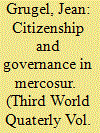

|
|
|
| 3 |
ID:
077060
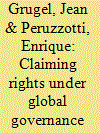

|
|
|
| 4 |
ID:
158919
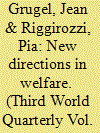

|
|
|
|
|
| Summary/Abstract |
What happens to the politics of welfare in the Global South when neoliberal values are questioned? How is welfare re-imagined and re-enacted when governments seek to introduce progressive change? Latin America provides an illustration and a valuable entry point to debates about ‘interruptions’ of neoliberalism and the changing nature of social policy. Drawing on examples of disability policies in Ecuador and care provision in Uruguay, we argue that there is a ‘rights turn’ in welfare provision under the left that reflects a recognition that previous welfare models left too many people out, ethically and politically, as well as efforts to embed welfare more centrally in new patterns of respect for socio-economic and identity-based human rights. Given Latin America’s recent contestation of neoliberal development as well as its history of sometimes dramatic welfare shifts, the emergence of rights-based social provision is significant not just for the region but also in relation to global struggles for more equitable governance.
|
|
|
|
|
|
|
|
|
|
|
|
|
|
|
|
| 5 |
ID:
140270
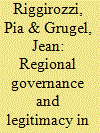

|
|
|
|
|
| Summary/Abstract |
Over the last decade, rapid changes to development models and market rules have led—yet again—to a revision of the meaning of regionalism, bringing to the fore the role of regional organizations in anchoring democracy and supporting progressive social policies. This is particularly the case in South America, where the presence of regional organizations in public policy-making is a subject of increasing scrutiny. This article examines new forms of politically sensitive regional governance in South America, focusing in particular on the case of the Union of South American Nations (UNASUR). It shows how contemporary South American regionalism bypasses the questions of trade and investment that dominated earlier schemes of regionalism in order to focus on shoring up democracy and managing the regional social deficit. The article explores UNASUR's actions in two policy areas: supporting the regional democratic norm and health policy. UNASUR, this article argues, is developing a hybrid form of output-focused legitimacy that rests on a combination of credible commitments to welfare promotion, especially for the poor, and the pursuit of collective public goods, alongside a robust defence of quite minimal but uncontroversial standards of procedural democracy across the region. The analysis challenges the view that regionalism has failed in South America and identifies instead the emergence of a new sort of highly political regionalism. We call for UNASUR to be taken more seriously in the literature on comparative regionalism and, indeed, for a revision of how regionalism more widely is understood in Latin America.
|
|
|
|
|
|
|
|
|
|
|
|
|
|
|
|
| 6 |
ID:
001605
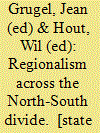

|
|
|
|
|
| Publication |
London, Routledge, 1999.
|
| Description |
xx,198p.
|
| Standard Number |
0415162122
|
|
|
|
|
|
|
|
|
|
|
|
Copies: C:1/I:0,R:0,Q:0
Circulation
| Accession# | Call# | Current Location | Status | Policy | Location |
| 041188 | 337/GRU 041188 | Main | On Shelf | General | |
|
|
|
|
| 7 |
ID:
116851
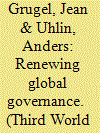

|
|
|
|
|
| Publication |
2012.
|
| Summary/Abstract |
Global inequality is increasing. Global inequalities are an expression of global social injustices and 'pathologies of power'. Global governance has been posited as a way forward. However, global governance will not deliver justice unless it embraces a more radical vision of what justice means and permits the voices of the marginalised to be heard in spaces of decision making. We identify two important approaches to building more just forms of global governance: the civil society approach, which is useful when it draws attention to the agency of those at the margins of global circuits of power; and the rights-based approach, which can provide opportunities for justice claims by marginalised groups.
|
|
|
|
|
|
|
|
|
|
|
|
|
|
|
|
| 8 |
ID:
076520
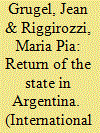

|
|
|
|
|
| Publication |
2007.
|
| Summary/Abstract |
Argentina's economic collapse in December 2001 is seen as perhaps the most emblematic evidence of the failure of neoliberalism to provide sustainable and equitable economic growth in the developing world. A new policy frame has gradually emerged in Argentina which relies on a more active statein the promotion of growth. This article examines what state-led growth can mean in the context ofopen markets. It explores in detail the policies implemented since 2002 and asks to what extent they constitute a possible route to stable post-crisis governance.
|
|
|
|
|
|
|
|
|
|
|
|
|
|
|
|
| 9 |
ID:
137248
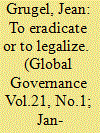

|
|
|
|
|
| Summary/Abstract |
International human rights agreements promote rights-based norms as a guide for policymaking. But the appropriateness and legitimacy of these norms is sometimes questioned in local contexts, where they can generate disagreement as to their meaning and implementation. Convention 182 of the International Labour Organization (ILO) led to a global commitment to eliminate the worst forms of child labor, but the agreement has been subject to intense criticism, especially in societies where child labor is prevalent such as Bolivia. This article sheds light on the complex impact of global rights-based norms in local contexts and reminds us that civil society is always a heterogeneous and political space of action. This article also traces the complex debate on eradication versus legalization of child labor within Bolivia.
|
|
|
|
|
|
|
|
|
|
|
|
|
|
|
|